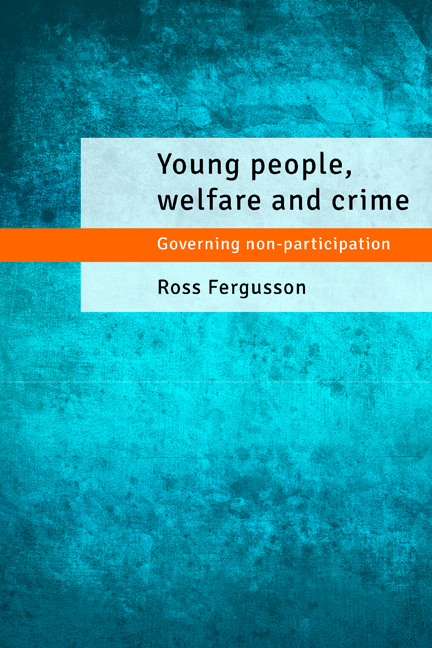Book contents
- Frontmatter
- Dedication
- Contents
- Detailed contents
- List of figures and tables
- List of abbreviations
- About the author
- Acknowledgements
- Part One The crisis of non-participation
- Part Two Work, welfare and crime: research and policy
- Part Three Theorising non-participation
- Part Four Criminalising non-participation
- References
- Copyright material
- Index
Eight - The advance of criminalisation
Published online by Cambridge University Press: 01 September 2022
- Frontmatter
- Dedication
- Contents
- Detailed contents
- List of figures and tables
- List of abbreviations
- About the author
- Acknowledgements
- Part One The crisis of non-participation
- Part Two Work, welfare and crime: research and policy
- Part Three Theorising non-participation
- Part Four Criminalising non-participation
- References
- Copyright material
- Index
Summary
Social science research has not been very effective in providing alternative understandings of youth crime. Neo-positivism, along with administrative criminology, through criminal career research, has dominated the theorising and old explanations of youth crime. Its influence on policy has been enormous, shifting the focus away from exploring how and why the young might engage in crime or how the state might be criminalising the young.
Alan France (2007) Understanding youth in late modernity, pp 113–14Introduction
The previous chapter argued that Habermas’ and Tyler’s theories have a distinctive capacity to contribute to a reinterpretation of non-participation and its claimed relationship to crime. It also drew attention to the ways in which the points of intersection between governmentality theories and other theories of the governance of crime offer fruitful ways for understanding how ‘governing through unemployment’ and ‘governing through crime’ might be linked. This chapter begins its exploration of the capacity of the work of these two theorists for reinterpreting the non-participation-crime relationship by considering the importance of the concept of juridification to Habermas’ theories. Of particular interest are the ways in which the priorities of demands generated by systems of money and power are brought to bear on aspects of the lifeworld; and the relationship between the concepts of juridification and criminalisation. In Section 2, three different modes of criminalisation are identified, and their relationship to modes of governance is considered, referencing Tyler’s work. Section 3 extends the discussion through a critical assessment of current manifestations of criminalisation from the perspective of jurisprudence. Sections 4 and 5 consider of the criminalisation of non-participation itself, and the powers for further criminalisation already in place that are available to be deployed as a response to endemic mass non-participation among young people.
Section 1: Juridification and criminalisation
Habermas (1981/1987, p 357) defines juridification as ‘the tendency toward an increase in formal (or positive, written) law that can be observed in modern society’. Of particular significance here, the first recorded use of the term (Kirchheimer, 1928) identified it as a trend towards the increased regulation of political struggle and conflict, particularly in relation to labour law. Habermas identifies four epochal waves of juridification at different stages of state formation. Each wave marks an episode in Habermas’ incremental uncoupling of system and lifeworld.
- Type
- Chapter
- Information
- Young People, Welfare and CrimeGoverning Non-Participation, pp. 193 - 220Publisher: Bristol University PressPrint publication year: 2016



